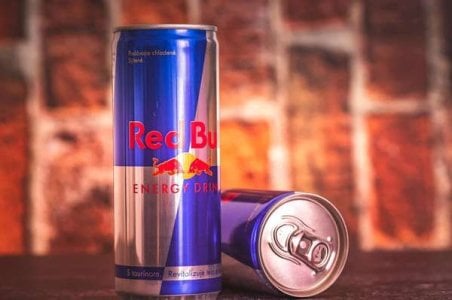New study sparks alarm over a popular drink linked to serious health concerns
By
Maan
- Replies 7
Energy drinks are a staple for many seeking a quick boost, but new research is shedding light on unexpected risks tied to a common ingredient.
What started as a routine examination of these popular beverages has revealed findings that could have significant health implications.
Scientists are now urging a closer look at how this ingredient might influence serious medical conditions.
A recent study raised concerns about a common additive in many energy drinks potentially increasing the risk of blood cancers.
Researchers from the University of Rochester in New York discovered that taurine, an amino acid frequently found in beverages like Red Bull and Celsius, could fuel leukaemia cells developing in bone marrow.
The team warned consumers to be cautious when drinking products containing taurine, which is widely available in supermarkets worldwide.
‘Since taurine is a common ingredient in energy drinks...our work suggests that it may be of interest to carefully consider the [risks and] benefits of supplemental taurine in leukaemia patients,’ the study, published in Nature, stated.
Taurine is naturally produced by the body and has been used to help ease chemotherapy side effects in leukaemia patients.
However, the researchers cautioned that additional taurine intake might worsen blood cancer progression.
Their findings highlighted the need to thoroughly evaluate the risks and benefits of taurine supplementation for leukaemia patients and the general population who consume energy drinks.
While the research remains in its early stages, the scientists expressed hope that blocking taurine uptake in leukaemia cells could offer a new treatment approach.
Experiments involving mice and human leukaemia cells demonstrated that preventing taurine from entering cells slowed the disease’s advancement.
This study was part of a wider investigation into taurine’s potential role in other cancers, such as colorectal cancer.
According to the Mayo Clinic, taurine naturally occurs in protein-rich foods like meat and fish.
It is commonly added to energy drinks because it supports digestion, maintains hydration and electrolyte balance, and aids central nervous system function.
The research focused on mice with the SLC6A6 gene, responsible for transporting taurine within the body.
Human leukaemia cell samples were also transplanted into these mice for testing.
Results showed that a group of healthy bone marrow cells produced taurine—the environment where leukaemia grows.
Cancer cells feed on this taurine, using it as an energy source to multiply and spread.
The SLC6A6 gene then transports taurine from the bone marrow to the leukaemia cells.
By consuming taurine, cancer cells undergo glycolysis—a process that breaks down glucose to generate energy—helping them divide more rapidly and making the disease more aggressive.
Cancer Australia reported that 5,202 new leukaemia cases were diagnosed in Australia in 2022.
Around 2,121 people died from the disease during the same year.
Currently, about 135,000 Australians live with blood cancer or related blood disorders.
In a previous story, we explored how common beverages can impact your health in unexpected ways.
This connection sheds new light on why certain popular drinks are facing recalls and scrutiny.
Read on to find out what happens to your body after drinking these drinks.

With new research highlighting potential risks linked to a common energy drink ingredient, how will this change the way you view your favourite boost? Let us know your thoughts in the comments.
What started as a routine examination of these popular beverages has revealed findings that could have significant health implications.
Scientists are now urging a closer look at how this ingredient might influence serious medical conditions.
A recent study raised concerns about a common additive in many energy drinks potentially increasing the risk of blood cancers.
Researchers from the University of Rochester in New York discovered that taurine, an amino acid frequently found in beverages like Red Bull and Celsius, could fuel leukaemia cells developing in bone marrow.
The team warned consumers to be cautious when drinking products containing taurine, which is widely available in supermarkets worldwide.
‘Since taurine is a common ingredient in energy drinks...our work suggests that it may be of interest to carefully consider the [risks and] benefits of supplemental taurine in leukaemia patients,’ the study, published in Nature, stated.
Taurine is naturally produced by the body and has been used to help ease chemotherapy side effects in leukaemia patients.
However, the researchers cautioned that additional taurine intake might worsen blood cancer progression.
Their findings highlighted the need to thoroughly evaluate the risks and benefits of taurine supplementation for leukaemia patients and the general population who consume energy drinks.
While the research remains in its early stages, the scientists expressed hope that blocking taurine uptake in leukaemia cells could offer a new treatment approach.
Experiments involving mice and human leukaemia cells demonstrated that preventing taurine from entering cells slowed the disease’s advancement.
This study was part of a wider investigation into taurine’s potential role in other cancers, such as colorectal cancer.
According to the Mayo Clinic, taurine naturally occurs in protein-rich foods like meat and fish.
It is commonly added to energy drinks because it supports digestion, maintains hydration and electrolyte balance, and aids central nervous system function.
The research focused on mice with the SLC6A6 gene, responsible for transporting taurine within the body.
Human leukaemia cell samples were also transplanted into these mice for testing.
Results showed that a group of healthy bone marrow cells produced taurine—the environment where leukaemia grows.
Cancer cells feed on this taurine, using it as an energy source to multiply and spread.
The SLC6A6 gene then transports taurine from the bone marrow to the leukaemia cells.
By consuming taurine, cancer cells undergo glycolysis—a process that breaks down glucose to generate energy—helping them divide more rapidly and making the disease more aggressive.
Cancer Australia reported that 5,202 new leukaemia cases were diagnosed in Australia in 2022.
Around 2,121 people died from the disease during the same year.
Currently, about 135,000 Australians live with blood cancer or related blood disorders.
In a previous story, we explored how common beverages can impact your health in unexpected ways.
This connection sheds new light on why certain popular drinks are facing recalls and scrutiny.
Read on to find out what happens to your body after drinking these drinks.
Key Takeaways
- A study found that taurine in energy drinks may fuel leukaemia cells and increase blood cancer risks.
- Researchers urged caution for leukaemia patients and energy drink consumers due to taurine’s effects.
- Blocking taurine uptake slowed leukaemia progression in mice and human cells.
- In 2022, Australia had over 5,000 new leukaemia cases and around 2,100 deaths.
With new research highlighting potential risks linked to a common energy drink ingredient, how will this change the way you view your favourite boost? Let us know your thoughts in the comments.








